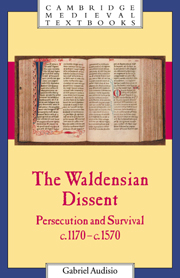Book contents
- Frontmatter
- Contents
- List of maps
- Preface
- Acknowledgements
- Introduction
- 1 1170 – 1215: decisive and purposive origins
- 2 The thirteenth century: the need to adapt
- 3 The fourteenth century: the challenge of believing differently
- 4 The fifteenth century: the risks of longevity
- 5 The constraints of a life in hiding
- 6 The need to organise
- 7 A culture of their own: the written and the spoken word
- 8 The sixteenth century: the end as a way forward?
- 9 Epilogue: the Waldensian Church
- Conclusion
- Bibilography
- Index
- Cambridge Medieval Textbooks
7 - A culture of their own: the written and the spoken word
Published online by Cambridge University Press: 05 June 2012
- Frontmatter
- Contents
- List of maps
- Preface
- Acknowledgements
- Introduction
- 1 1170 – 1215: decisive and purposive origins
- 2 The thirteenth century: the need to adapt
- 3 The fourteenth century: the challenge of believing differently
- 4 The fifteenth century: the risks of longevity
- 5 The constraints of a life in hiding
- 6 The need to organise
- 7 A culture of their own: the written and the spoken word
- 8 The sixteenth century: the end as a way forward?
- 9 Epilogue: the Waldensian Church
- Conclusion
- Bibilography
- Index
- Cambridge Medieval Textbooks
Summary
Dissenters as they were, the Poor of Lyons belonged nevertheless to their time. This did not mean they were completely identical to their contemporaries. In economic terms, they resembled those around them once the mam body of believers had given up the original tenet of absolute poverty. Poor and richer fellows lived together in the same religious community. In social terms, they formed an ensemble which was strikingly homogeneous, for apart from a few, rare exceptions, they all worked the land. While it was truly original for a dissenting group to come essentially from the peasantry, they did not contrast in any way with the population in Europe which was predominantly rural from the fourteenth to the sixteenth century. In linguistic terms too, they fitted perfectly into the various regions where they had settled. After the necessary period of adaptation for those of them who were immigrants, which was often the case, they quickly adopted the language used locally in their adoptive country. They indeed adapted so well, so conclusively, that the diaspora was split into two linguistic unities, the Germanic populations and the Romance populations. While links between the two did exist, they nevertheless proved tenuous. Beyond these shared features, the Poor of Lyons were, however, very distinct from their contemporaries. If they were not assimilated over the centuries, it was of course due to their religious dissent in itself, but also more generally to the culture they developed of their own.
- Type
- Chapter
- Information
- The Waldensian DissentPersecution and Survival, c.1170–c.1570, pp. 143 - 160Publisher: Cambridge University PressPrint publication year: 1999



